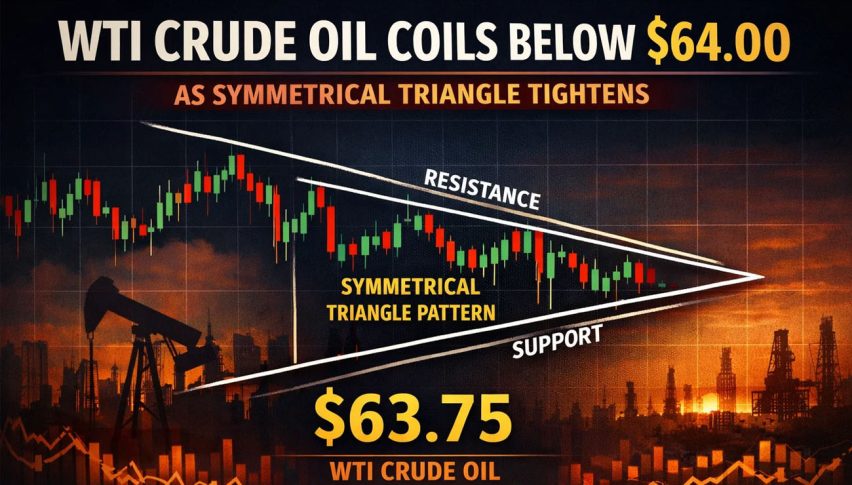WTI Crude Oil Prices Slide Below $60 Amid Demand Concerns, Despite EIA Draw
After a brief retrace higher to $65 in WTI WT Oil prices, crude’s rally gives way to renewed selling pressure, falling below $60 today.

Quick overview
- WTI crude oil prices have fallen below $60 per barrel after a brief rally to $65, indicating renewed selling pressure.
- Despite a larger-than-expected draw in US crude inventories, market sentiment remains bearish due to concerns over global demand.
- The upcoming OPEC+ meeting on May 5 is crucial, as decisions on production levels could significantly impact oil prices.
- Overall, the current market dynamics reflect uncertainty, with traders closely monitoring macroeconomic factors and geopolitical developments.
After a brief retrace higher to $65 in WTI WT Oil prices, crude’s rally gives way to renewed selling pressure, falling below $60 today.
After several weeks of volatility, West Texas Intermediate (WTI) crude oil prices have once again taken a sharp turn downward, falling below the key $60 per barrel mark. The market, which had seen a modest rebound in mid-April, is now grappling with renewed uncertainty over global demand and looming policy decisions from OPEC.
Recovery Stalls at Resistance
WTI crude had been in a steady downtrend since mid-January, bottoming out near $55 per barrel in early April. A temporary reprieve came as trade tariffs were postponed, helping lift prices back up by around $10 in just two weeks. That rally was further fueled by expectations of tighter global supply and rising geopolitical tensions, briefly pushing prices toward the psychologically significant $65 level.
WTI Oil Chart Daily – Previous Support at $65 Turns Into Resistance
However, that zone, which once acted as firm support, has now turned into a barrier. As crude prices touched $65 again, upward momentum faded quickly, and the market began to reverse course.
Inventory Draw Fails to Halt Selloff
Despite a larger-than-expected draw in US crude inventories, as reported by the Energy Information Administration (EIA), the market failed to hold gains. Prices resumed their slide, and by today, WTI crude had slipped decisively below $60, signaling a breakdown in bullish sentiment.
Traders had hoped that signs of declining US stockpiles would inject some optimism, but broader concerns around demand, especially amid ongoing trade tensions, have taken precedence. The weakening outlook for global consumption is now overshadowing supply-side developments.
OPEC Meeting Looms Large
Looking ahead, oil markets are closely watching the upcoming OPEC+ meeting on May 5, where the cartel’s production strategy for the coming months will be clarified. Any decision to ease or maintain current output levels could significantly sway price direction.
With the trade war still dominating headlines and economic data pointing to mixed signals, crude oil’s next major move may depend less on inventories and more on macroeconomic factors and policy outcomes.
US Weekly Petroleum Inventory Report – Week Ending April 25, 2025
EIA (Energy Information Administration) Data:
- Crude oil inventories fell by 2.696 million barrels, a sharp drawdown compared to the expected +429K build.
- Prior week’s figure was a +244K build.
- The unexpected decline suggests stronger-than-anticipated demand or reduced domestic production.
- Gasoline inventories saw a significant draw of 4.003 million barrels, well beyond the expected -1.031 million.
- Implies robust consumption ahead of peak driving season or tighter supply dynamics.
- Distillate inventories (including diesel and heating oil) rose by 937K barrels, contrasting the -1.566 million decline forecast.
- This increase may reflect soft industrial demand or a temporary supply glut.
API (American Petroleum Institute) Private Inventory Estimates (Reported Day Before):
- Crude stockpiles rose by 3.76 million barrels, diverging notably from the EIA’s reported draw.
- Gasoline inventories decreased by 3.14 million barrels, broadly confirming EIA’s report of a substantial draw.
- Distillate inventories declined by 2.52 million barrels, contradicting the EIA’s reported rise.
The weekly EIA data showed a larger-than-expected drop in crude and gasoline inventories, pointing to potentially tightening market conditions, despite contrasting signals from API figures. The divergence between public and private reports, particularly on crude, could lead to short-term volatility in oil prices.
Overall, the data hints at resilient gasoline demand and potential tightening ahead of the summer season, keeping traders on alert for further draws or supply bottlenecks.
Conclusion
WTI’s fall below $60 highlights the fragility of the recent rally and reflects deeper anxieties about global demand and geopolitical uncertainty. Unless demand prospects improve or OPEC signals a willingness to cut further, the path for crude could remain choppy through May.
US WTI Crude Oil Live Chart
- Check out our free forex signals
- Follow the top economic events on FX Leaders economic calendar
- Trade better, discover more Forex Trading Strategies
- Open a FREE Trading Account
- Read our latest reviews on: Avatrade, Exness, HFM and XM



